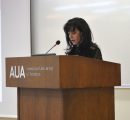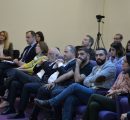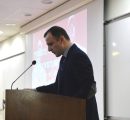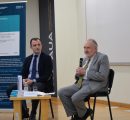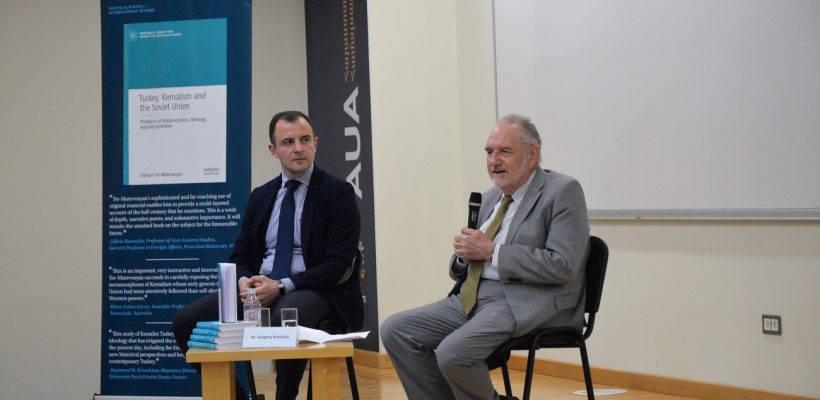
PSIA Program Chair Dr. Vahram Ter-Matevosyan Presents his Book on Turkey, Kemalism and the Soviet Union
2 min readYEREVAN, Armenia – On May 6, 2019, the American University of Armenia (AUA) Political Science and International Affairs (PSIA) Program Chair Dr. Vahram Ter-Matevosyan presented his recent book “Turkey, Kemalism and the Soviet Union: Problems of Modernization Ideology and Interpretation.” The book was released by Palgrave Macmillan in March 2019. Dr. Ter-Matevosyan has authored three books and more than 70 academic articles, book chapters and book reviews. He has published extensively on the topic of Turkey, particularly looking into its ideological construction.
This was not the first time Dr. Ter-Matevosyan presents his new book. Earlier, in April 25-30, Professor Ter-Matevosyan was on a book tour in Turkey, visiting leading universities in Istanbul and Ankara, where his talks were attended by large audiences and generated numerous questions and widely favorable comments.
During the book launch at AUA, Interim Dean of the College of Humanities and Social Sciences (CHSS) Dr. Alina Gharabegian made the opening remarks applauding the significance of this undertaking. In her words, “This is a momentous book. It’s a book of historical importance, as it marks the possibility of a turn – a paradigmatic, epistemological turn to new spaces – spaces of exploration intellectual communion, and potential reconsideration of historical perspectives.”
Dr. Ter-Matevosyan began his presentation by first acknowledging all those family members and colleagues who have supported him through the process of writing the book. He then presented the book content, which is an examination of the Kemalist ideology of Turkey from two perspectives. The book reveals major problems in the existing interpretations of the topic and how incorporating the Soviet perspectives enriches the historiography and our understanding of that ideology. To address these questions, the book looks into the origins, evolution, and transformational phases of Kemalism between the 1920s and 1970s.
The research also focuses on perspectives from abroad by observing how republican Turkey and particularly its founding ideology were viewed and interpreted by Soviet observers. The author then continues the analysis paying closer attention to the diplomatic, geopolitical, and economic complexities of Turkish-Soviet relations. The contribution the book makes also stems from the fact that scholars have rarely problematized those perceptions of Turkish ideological transformations. Looking at various phases of Soviet attitudes towards Kemalism and its manifestations through the lenses of Communist leaders, party functionaries, diplomats and scholars, the book illuminates the underlying dynamics of Soviet interpretations.
Following the presentation, CHSS Professor Gregory Areshian raised a couple of questions to the author and remarked on the urgent need to work on the book’s translation to Armenian, emphasizing its worth and importance. Dr. Areshian then served as discussant of the Q&A session, during which the audience had the opportunity to seek elaborations on some key aspects in the book.
The complete talk is available here.
The AUA PSIA program equips students with advanced analytical reasoning, critical thinking, and communication skills through the study of political science and international affairs, emphasizing local and global perspectives and practical applications of theory. The program aims to provide world-class research and teaching, through which graduates can best contribute to the development of the nation.
Media Coverage:
[1inTV] Book Presentation: Turkey, Kemalism and the Soviet Union, Վահրամ Տեր-Մաթեւոսյանի գրքի շնորհանդեսը
[ArmeniaTV News] Թուրքիան, Քեմալիզմը և Խորհրդային Միությունը․ Լույս է տեսել պատմաբան Վահրամ Տեր-Մաթևոսյանի նոր գիրքը

